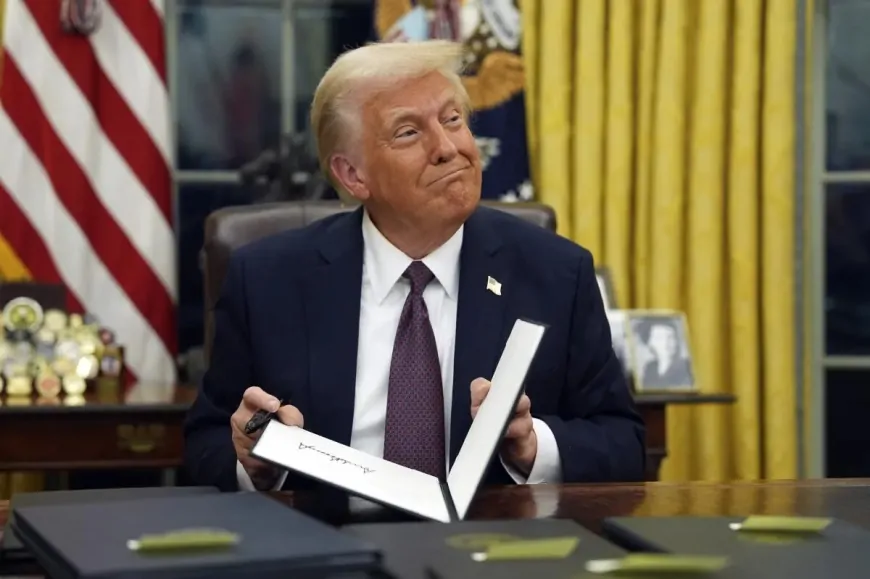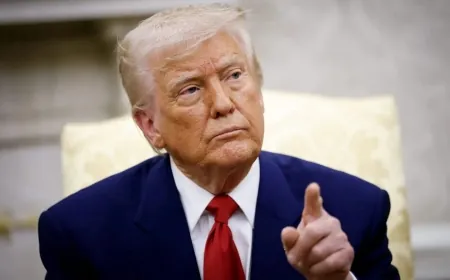Live Updates: Trump to Implement Reciprocal and Auto Tariffs in April; Steel and Aluminum Tariffs Coming in March
Live updates on Trump's plan to enforce reciprocal and auto tariffs by April, with steel and aluminum duties starting in March, impacting global trade.

US President Donald Trump is moving ahead with new tariffs in an effort to change the country’s trade policies. His administration plans to introduce taxes on imported cars and apply “reciprocal tariffs” on trading partners by April. At the same time, tariffs on steel and aluminum will take effect in March.
Trump’s original plan to impose a 25% tax on all imports from Canada and Mexico has been delayed until early March. However, tariffs on Chinese goods started in February, leading China to strike back with its own tariffs on US products. Last week, Trump announced a 25% tariff on all steel and aluminum imports from every country. This move is designed to protect US industries but could create tension with America’s biggest trading partners.
Also Read: Trump Imposes 25 Percent Tariff on Steel and Aluminum Imports CFPB Shutdown
On Thursday, Trump signed an order allowing reciprocal tariffs to begin as early as April. This means the US could impose the same level of taxes on imports from countries that place high tariffs on American goods. The measure is part of Trump’s promise to reduce what he sees as unfair trade practices. At the same time, Republicans are preparing a new tax and spending bill, and these tariffs could provide extra government revenue.
Another major change is the planned tariff on imported cars, also expected in April. This could affect major automakers from Europe and Asia, potentially raising car prices in the US.
Experts warn these tariffs might lead to higher prices for everyday goods, increasing the cost of living. This could also push the Federal Reserve to raise interest rates, affecting loans and mortgages.
As Trump continues to push his tariff policies, the global response and long-term effects on the US economy remain uncertain. Many are watching closely to see how these changes will impact businesses, consumers, and international trade relationships.
Follow Live Updates from here...
Key Moments
- Trump plans to impose reciprocal and auto tariffs by April.
- Steel and aluminum duties will take effect in March.
- New tariffs aim to reshape US trade policy and boost revenue.
- Tariffs could raise prices and impact global trade relationships.
-
President Trump Confirms 25% Auto Tariffs Expected in April
President Donald Trump announced on Tuesday that upcoming tariffs on imported automobiles will be "in the neighborhood of 25%," with further details to be revealed closer to April 2.
The announcement aligns with the administration's timeline, as several key reports on trade policies are expected to be released by April 1. These reports could pave the way for new tariffs targeting specific industries or broader reciprocal measures against other countries' imports.
-
Trump Plans 25% Tariffs on Pharmaceuticals and Semiconductor Chips
President Donald Trump has announced plans to impose significant tariffs on pharmaceutical and semiconductor imports, following the scheduled auto tariffs in April. Speaking at his Mar-a-Lago estate in Florida on Tuesday, Trump stated that these sector-specific tariffs would start at "25% or higher" and could increase over the next year.
While no official date has been set for implementing these duties, Trump mentioned that the delay would allow drug and chip manufacturers time to establish production facilities in the United States to avoid the tariffs.
He also hinted that several major global companies might announce new investments in the US in the coming weeks but did not provide additional details.
-
Trump Signs Order to Make IVF More Affordable and Accessible
President Donald Trump signed an executive order to make in vitro fertilization (IVF) more affordable and easier to access for people struggling to have children. The order aims to lower the high costs of fertility treatments and improve availability across the country.
Trump also issued a separate directive calling for "radical transparency" from government agencies. He said this could help reduce unnecessary spending, though he did not share specific steps or timelines for these changes.
-
Pentagon Provides Lists of Probationary Workers to Government Efficiency Office
Officials confirmed that staff from the Department of Government Efficiency (DOGE) were at the Pentagon on Tuesday, receiving lists of the military’s probationary employees. Each branch of the military had until the end of the day to identify these workers.
It remains unclear whether all probationary employees will face dismissal. Some workers performing critical duties may be exempt from potential job cuts. The affected personnel include civilian defense employees who are new to their roles—uniformed military members are not impacted.
These potential staff reductions at the Pentagon follow similar actions at other federal agencies. Recently, probationary employees, including those with high-level security clearances at the National Nuclear Security Administration, were dismissed despite their critical responsibilities.
-
Rubio Meets UAE Leaders After Key US-Russia Talks on Ukraine War
U.S. Secretary of State Marco Rubio met with UAE President Sheikh Mohammed bin Zayed Al Nahyan on Wednesday, ending a trip that included the highest-level discussions between the U.S. and Russia since the Ukraine war began in 2022.
In their meeting, Rubio thanked the UAE for its strong partnership and ongoing support, according to State Department spokesperson Tammy Bruce. The UAE has played an important role in helping to arrange prisoner exchanges between Russia and Ukraine.
Although the UAE did not release an official statement, the state-linked newspaper The National reported that Sheikh Mohammed told Rubio the UAE strongly opposes any attempt to force Palestinians out of Gaza.
Rubio’s visit comes as the U.S. tries to maintain a fragile ceasefire between Israel and Hamas in the Gaza Strip.
-
Elon Musk Stays Silent on Trump’s Tariff Plans
Despite being outspoken on many issues, Tesla CEO Elon Musk has not commented publicly on President Trump’s tariff policies. While Musk often shares his opinions on social media, he has remained quiet about the administration’s tariff plans affecting various industries, including automotive manufacturing.



































































